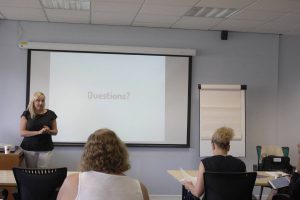Promoting memory
Our CPD event on promoting memory was very interesting for me, here’s a summary for those of you who couldn’t make it.
The Brain
We only use 10% of our brain – a perceived fact backed up by Einstein himself, which is a myth. It is unknown exactly how much of the brain we actually use, but what we do know is that we use more than 10%.
Fact; the brain consists of over 86 billion neurons, accounts for 3% of our body weight and is accountable for 20% of the energy we use. The brain is central in memory.
Types of memory
There are two types of memory; short and long-term. Short-term memory (STM) has limited capacity, a short duration and specific ways of encoding. Long-term memory (LTM) has unlimited capacity, and there for your retrieval.
Short-term memory; to remember in STM we must pay full attention to it, otherwise it becomes lost. Rehearsed material gets transferred into our LTM through encoding.

Forming long-term memories can be done in a variety of ways. One way we form long-term memories is through semantics by attaching meaning to it, for example we learn that a bike moves. If the memory was learnt through an episodic way it would be that you sat on a bike while it moved. Procedural is simply muscle memory, like getting on a bike and riding without much thought.
Improving long-term memories There have been several strategies devised in order to improve long-term memories, things such as; spaced learning, repeated practice, elaborating memories and intelligent questioning. Sleep has also been deemed to strengthen memories in children and young people. During sleep, the brain strengthens memories, this is why when we sleep we sometimes have random dreams; it is also the brain's way of clearing out all the information that’s not necessary. This is why teenagers and young children need lots of sleep.
Promoting memory in education
If a child seems to have difficulties with their memory, it is necessary to assess and help them to reduce the stress on their brain (cognitive overload).
Ways to reduce cognitive overload include:
- Providing a processing time of at least three seconds
- Visual supports, including task boards and visual timetables
- Repeating instructions
- Using a recording device
Training programmes
Effective memory training involves activities that stretch memory as well as repeated and intensive practice. People should do 10-15 minutes day, for 6 weeks to promote memory.
There are a few training programmes which we suggest; Cogmed - www.pearsonclinical.co.uk/cogmed Jungle memory - www.junglememory.com
Rehearse, rehearse, rehearse!
In a nutshell… short-term memories need to be paid attention to, in order to become a long-term memory. The short-term memory is limited by capacity, duration and encoding. It is also important that we place more emphasis on promoting memory within the education system.
If you’d like to learn more about memory, or find out how we can help then please contact us.
Be the first to find out about our upcoming CPD events by signing up to our mailing list on our CPD events page.











